COMMON NEW PUPPY PROBLEMS
This is extended information that we have learned over the years so it can be very helpful, but it is a long read. More info will be added as we learn ourselves.
The move to a new home will cause some stress to your new puppy. He/she will love all the attention that you are able to give him/her, but your pup will however miss his/her mother, siblings, and the people who raised him/her. At first you won't notice much bad habits in your pup, but after about a week or two, these bad habits could start to develop. Reading and applying this page helps a lot with common bad puppy habits and how to fix them. Contact us any time if you have questions, and of course, you can always do a google search.
Text or call: (336) 250-3683
Email: DeckerDoodlesNC@gmail.com
Potty Training
Your new puppy will need to potty very often. We suggest taking him/her out as soon as he/she eats, when he wakes from a nap, when he is taken out of the crate, early AM, and late PM, and anytime it has been a while since he/she has been out. When you are not watching your puppy leave him/her in the crate or small play area. It is important to "catch" your puppy if it has a potty accident so you can take it outside right away. If you see your puppy start to squat say “outside” and pick it up and take him/her outside and then say "go potty" (or whatever term you use). You can also reward when it “goes potty” outside. If you are using the bell, make sure to help your puppy to ring the bell when you take it out to potty.
Crate training is highly recommended as an effective and safe way to potty train a puppy. I have started the crate training process here. There are many types of crates available. I recommend getting a crate that will fit your dog as an adult…one with two doors is best. A good size for a Petite Goldendoodle size is 30-inch, Mini Goldendoodle is 32-inch size. Medium Goldendoodle is 36-inch. Get one that has a divider so it won’t be too big at first. The basis of crate training uses the idea that a dog does not like to soil its bed area to facilitate house breaking. The crate should be used anytime you cannot give your puppy your undivided attention. These times may include: dinnertime, cleaning the house, etc. If the puppy is unattended for any length of time it will have an accident. I do recommend confining the puppy to whatever area you are in to watch for behaviors that indicate the puppy needs to go potty. The puppy may need to go to the bathroom every 3-4 hours when crated and even more frequently if it is out in the house playing (every 30-45 minutes), but with time 4 to 8 hours can be achieved. Taking the puppy outside to its designated area, giving it its command to potty, and praising it for good behavior will aid greatly in house breaking. Treats can also be used to help the puppy want to go outdoors to potty. The emphasis on praise versus discipline produces better house breaking results! Correcting the puppy after the fact (without catching it in the act) only confuses the puppy since it has no clue why you are correcting him at that point in time. A towel and a few toys are recommended for use in the crate. The puppy will try very hard not to urinate or defecate in the crate once it gets used to it. In time, the puppy will be able to go as long as 6 to 8 hours if necessary in the crate without an accident. Some people also hang a bell on the door and teach the puppy to ring the bell when it needs to go outside. Each time the pup is taken outside to potty, make it ring the bell with its paw. You can also keep your puppy on a leash inside so it doesn’t wonder too far from you. It will also help you not to forget to take your pup out frequently.


Chewing Everything
The most common complaint of new puppy owners is chewing and not chewing on toys or rugs but on fingers and toes! When the puppy has left its siblings, it soon decides that you and your family will make nice substitutes. Unfortunately, the puppy does not realize how painful its sharp teeth are. There are many suggestions to correct this problem. The puppy should not be allowed to chew on you or your family members from day one; substitute squeaky toys or rope toys for fingers and and say “no bite” when needed to help eliminate this problem. Keep in mind young puppies have lots of energy. Many of the destructive chewing behaviors and biting can be stopped by ensuring your puppy gets lots of exercise. A well exercised puppy is a happy puppy. You may want to take your pup to obedience school .Many of the pet stores offer obedience classes as well. We encourage you to go to training with your puppy and get your puppy certified in Canine Good Citizen. A well trained puppy is a joy to be around!






Find us on Social Media!
Contact and FAQ
Q: Where do we come to see or pick up our new puppy?
A: Greensboro, NC
Q: Is there a non-refundable deposit to reserve a puppy?
A: Yes, this helps us take you seriously and reserves your place in line. Reserve a pup by depositing $300 via Venmo, Square Cash, Zelle, Apple Cash, Mail a Check, or Hand Deliver Us Cash.
Q: Can we come to see a puppy before placing a deposit?
A: Yes! Just text, call, or email us. We have a line and are first come first serve based on who puts in their deposit first.
Click Here For More Questions and Answers
Text/Call: (336) 250-3683
Email: DeckerDoodlesNC@gmail.com
© 2025. All rights reserved.
